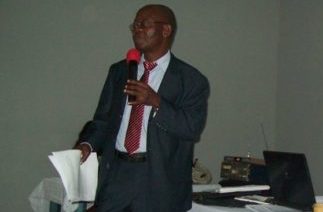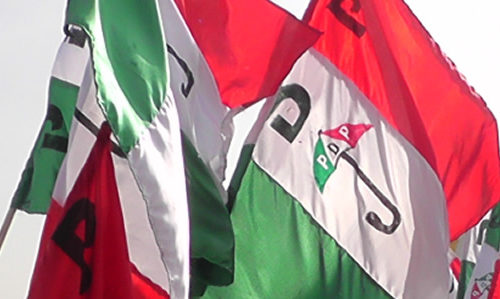Now that calm has been restored after the storm generated by the stringent accreditation criteria for media coverage of the national legislative assembly, we can now soberly interrogate the issues raised.
Mr. Emmanuel Agada, the Director of Information at the National Assembly who issued the accreditation criteria, is a man in a quandary – denounced by the media and disowned by the National Assembly leadership.
The criteria stipulated, among others, that media organization seeking coverage of the National Assembly must provide evidence of certificate of incorporation, tax returns for at least two years, Code of Certification from the National Library, membership of professional bodies for media organizations, a functional bureau in Abuja with not less than five editorial staff and daily circulation of 40,000 copies for the print media with evidence to support the claimed circulation figure.
Also, journalists seeking to be accredited must be registered with the Nigeria Union of Journalists (NUJ). For Online media houses to be accredited, they must publish daily and on weekend as well as provide clippings of their stories published in newspapers, which portrayed the dilemma of caging the ubiquitous media platform.
When Agada rolled out the criteria, the Nigerian Guild of Editors (NGE) went at him with a haymaker. The General Secretary of the NGE, Mary Atolagbe, in a May 20, 2019, swift counter-punch, had described the criteria as “primitive, undemocratic and blatantly anti-press and anti-people’’, vowing : ‘’It cannot stand’’. And it did not stand.
But, I consider the Guild of Editors’ shutdown – in its entirety – of the media accreditation criteria as too sweeping and dismissive, as some of those criteria – like the media house having Certificate of Incorporation, Code of Certification from the National Library, be registered with relevant professional body and the journalists seeking accreditation being registered with the NUJ could actually help sanitize media practice in the country.
These will, also, substantially help to eliminate the scourge of fake journalists- and by extension, fake news – while also ensuring that anybody cannot just operate a briefcase media house. These are issues the NGE, NUJ and the Newspapers’ Proprietors Association of Nigeria (NPAN) have been battling for decades. I believe demanding a daily newspaper circulation figure of 40,000 is a cynical way to deflate editors’ ego and humble newspaper houses, knowing that evidence to support such large circulation claim will be difficult to provide. In spite of my reservations, the Editors’ offensive achieved its purpose – it was potent enough to scare the National Assembly leaders into making a fall guy of Mr. Agada, given the speed of their disowning the criteria rollout, suspending it and setting up a probe panel to unravel the circumstances of its issuance.
Many media commentators have mostly towed the hard line of the NGE in condemning the criteria. Adekunle Ade-Adeleye’s column titled : ’’They are not done with the press’’ in The Nation newspaper of Sunday, May 26, 2019, representative of sentiments expressed by many pundits, had described the accreditation criteria variously as “nefarious regulations,’’ “abominable guidelines” and a “grievous concoction designed to abridge press freedom and invariably circumscribe free speech.” Strong words.
He, too, was not done with the National Assembly members as he launched into a tutorial on how National Assembly members should conduct themselves and why they should expose and disgrace the authors of the ill-advised accreditation criteria, as proof that the lawmakers do not harbor fifth columnists.
Ade-Adeleye is a thorough-bred, experienced and professionally trained journalist who should rather direct his tutorial to his own constituency, the media, on the need to practice ethical journalism, rather than live in denial. A general disposition among journalists, expressed in Ade-Adeleye’s column that “an imperfect press is still far better than a hamstrung and shackled press” is an untenable excuse for embarrassing errors of fact, news fabrication and gross violation of Code of Ethics by many journalists.
READ ALSO: Outrage as SARS Operatives Brutalise, Arrest Journalist in Port Harcourt
An odious reality of Nigerian media practice is that many of those parading the public arena as journalists lack the requisite training to be so addressed. So, if the National Assembly leadership, after suspending implementation of the controversial accreditation criteria, is being asked to expose and disgrace those who supposedly brought it into infamy, the media leadership too need to expose, suspend and disgrace those who disgrace the profession by their gross incompetence or ethics violation or both.
Journalists, especially those in the print media, who shun being regulated and are the most strident in holding others to account, cannot refuse to be held accountable for their professional misconduct. It is a matter of physician, heal thyself. The ruckus created by the suspended criteria for media accreditation to the National Assembly should, therefore, engender soul-searching and introspection among media stakeholder groups – the NUJ, NGE and NPAN – on the need to establish enforceable criteria for journalism/media practice in the country with a disciplinary committee that can impose sanctions on erring members. This is what obtains in respectable, established professions like medicine, law, and lately engineering and pharmacy – that, of course, is if professionally trained journalists are determined to make their profession respectable.
* Dr. Bisi Olawunmi, Senior Lecturer, Department of Mass Communication, Adeleke University, Ede. Osun State and Fellow, Nigerian Guild of Editors is former Washington Correspondent of the News Agency of Nigeria. Email: [email protected] Mobile phone (SMS ONLY) 0803 364 7571.











